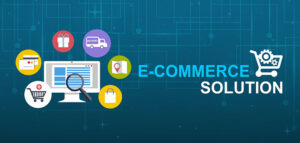Transform Your Online Store With Scalable, Seamless Shopping Experiences
In the ever-expanding world of online retail, having a digital storefront isn’t enough. In 2025, success in eCommerce demands more than just listing products on a website. It requires smart, integrated solutions that offer customers a seamless, secure, and personalized shopping experience from start to finish.
eCommerce solutions refer to the tools, platforms, and strategies used to create and manage an online store. These solutions can range from hosted platforms like Shopify and BigCommerce to custom-developed solutions built specifically for a brand’s unique needs. Regardless of the approach, the goal remains the same: deliver a fast, frictionless, and user-centric shopping journey that turns visitors into loyal customers.
Modern eCommerce is no longer just about transactions — it’s about experiences. Customers expect mobile responsiveness, intuitive navigation, product personalization, AI-driven recommendations, and secure checkouts. Delays in load time, clunky design, or limited payment options can lead to cart abandonment and lost revenue.
This is why businesses are increasingly turning to advanced eCommerce solutions that integrate seamlessly with other tools — such as inventory management systems, customer relationship management (CRM) platforms, email marketing tools, and analytics dashboards. These integrations allow for automation, better decision-making, and a more streamlined workflow.
In 2025, personalization is a game-changer. With AI and machine learning, eCommerce platforms can track user behavior in real time, offering personalized product recommendations, tailored discounts, and dynamic content that keeps users engaged. Customers now expect their shopping experience to be as unique as they are — and the brands that deliver on this expectation will gain a major competitive advantage.
Moreover, mobile commerce (m-commerce) continues to grow rapidly. More than half of all eCommerce traffic now comes from smartphones, which means your online store must be designed with a mobile-first approach. Fast load times, responsive design, and mobile-optimized checkout are no longer optional — they’re essential.
Security also plays a critical role in the eCommerce experience. Consumers are increasingly cautious about where and how they share their personal and payment information. Using secure payment gateways, SSL certificates, and complying with data protection regulations like GDPR and CCPA are vital to building trust and avoiding legal issues.
Scalability is another advantage of modern eCommerce solutions. Whether you’re just starting out or scaling internationally, your platform must support increasing traffic, growing product catalogs, and expanding customer bases without compromising speed or reliability.
Ultimately, smart eCommerce solutions empower businesses to grow, adapt, and compete in a crowded digital market. By investing in the right tools, technologies, and strategies, you can turn your online store into a high-performing sales engine in 2025 and beyond.
